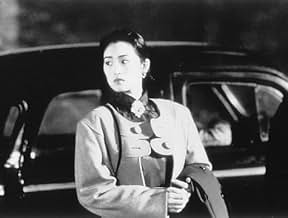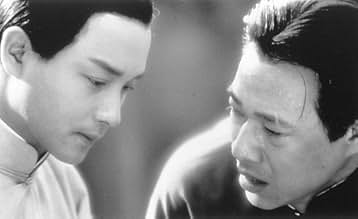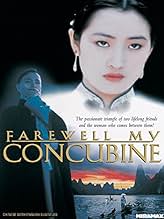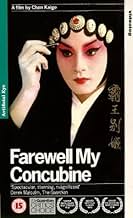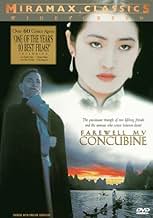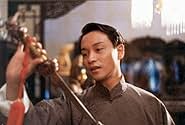IMDb-BEWERTUNG
8,1/10
35.339
IHRE BEWERTUNG
Die Geschichte zweier Männer, die sich als Schauspielschüler in der Pekinger Oper trafen und über 50 Jahre Freunde geblieben sind.Die Geschichte zweier Männer, die sich als Schauspielschüler in der Pekinger Oper trafen und über 50 Jahre Freunde geblieben sind.Die Geschichte zweier Männer, die sich als Schauspielschüler in der Pekinger Oper trafen und über 50 Jahre Freunde geblieben sind.
- Für 2 Oscars nominiert
- 24 Gewinne & 12 Nominierungen insgesamt
Zhenxiang Fei
- Shitou as a Child
- (as Yang Fei)
Empfohlene Bewertungen
10bluzman
As an WASP American married a lady from Mainland China, I have a great interest in and curiosity about China. My wife's mother and father actually saw these men perform. I have discussed this movie with many Chinese friends, most of whom saw it before coming to this country. Some of them knew the story from real life as well as the movie. They are quick to point out the accuracy of the story in its detailing of Chinese history from the end of the last dynasty until its end during the Cultural Revolution. They also claim that the major happenings in the movie are real events, not the norm for most of Hollywood's "real life" stories. One point of conjecture in the movie is the sexually of Dieyi. It is presumed he is/becomes a homosexual. However, from what I have learned about the Peking/BeiJing Opera through reading and discussions, it is more likely that Dieyi was virtually unaware of his own sexuality. As opposed to being a hetero or homosexual, he was asexual in a way like it had be surgically removed from his being. It had been taken from him through the rigors of his training and years of performance. His love for Xiaolou is powerful, maybe even surpassing ordinary man/woman love, but platonic in as much as his mind is devoid of its sexuality. He suffers the same jealous anger and sense of betrayal as might be found when a wife discovers the cheatings of her husband, and reacts, unfortunately, accordingly (Heroin). His real, enduring love is performing. It is the one constant that has seen him through. He throws himself into it, being willing to perform for anyone, even as it drives the story to the end. The end of the movie is not satisfying to everyone. It was not a Hollywood ending. However, it was reality.
This is, without the doubt, the very best of Chinese film making, acting and story telling. I didn't watch this movie only until last year, and there are no words were powerful enough to express my feelings. The acting were flawless, and the emotion in the entire film were so real and strong, you'll feel so attached the whole time. Leslie is the one and only actor who can fully deliver the role of ChengDieYi, and his work in this film is remarkable. A true milestone performance of his career and film acting. The story, The history, The culture, The acting!!!
A must see film!!!
A must see film!!!
I have seen this movie only once but it left an indelible impression on both me and my wife. It is a beautiful film with gorgeous photography, invisible direction and fantastic acting. What struck us most about this film was how many levels it had. It was a story about politics, love, life, faith, all rolled into one exceptional package. Yet none of these messages are hammered into you. They just flow over you in well-timed waves. Many of these Chinese movies are so interesting because of their unique perspective. It's wonderful to immerse yourself in a great film from a different culture. The many points of beauty in this movie are subtle, delicate and drenched in China's magnificent history. You have to experience it for yourself to understand, and once you do you'll fall in love with the world of Chinese cinema.
I finally got a chance to see "Farewell my Concubine." I'd been anxious to see it since its initial release in 1993. It surprised me in its depth and technical skill.
Three points make this film outstanding. The first is the technical skill of the director and the luscious taste of the director of photography. The entire film is a feast for the eyes, taking full advantage of elaborate costumes and exotic locations. The second strength is in the actual storytelling. The plot is a fascinating tragedy, it feels almost Shakespearean. The acting is nothing short of incredible. Some of China's finest actors demonstrate their ability to carry a story that covers 52 years. Normally, these two strengths alone would be reason enough to see a film, but "Farewell my Concubine" succeeds in satisfying one more category (the bain of any epic): historical accuracy.
"Farewell my Concubine" is exceptionally accurate in portraying the monumental changes that were sweeping China at the time. The film doesn't just treat these events as background events, but drags them right into the plot and pins the characters into their surroundings. This is interesting when you consider that the story takes place in the Peking Opera, not the most likely place for these events to have effect. Instead, as we see the new China emerge, we watch these vestiges of old society fall, and the work of all involved make this transition an achievement to behold. The power of this film was not missed by Chinese censors who banned, removed, and then banned the film again several times over -debating whether or not its artistic brilliance was worth subversive portrayals of suicide and homosexuality. Unlike "The Last Emperor," this film was made by Chinese film makers and is in tune with its subject. I recommend this film highly!
As one last note, the version I saw was a DVD containing the original 170 minute version of the film, in its wide-screen splendor. From what I understand, the shorter versions released internationally deleted and shortened some opera scenes for fear that they would be lost on Western audiences. Having no prior experience with any Peking Opera, I found the scenes fascinating and integral to appreciating the entire story. Spend the extra time if you can.
Three points make this film outstanding. The first is the technical skill of the director and the luscious taste of the director of photography. The entire film is a feast for the eyes, taking full advantage of elaborate costumes and exotic locations. The second strength is in the actual storytelling. The plot is a fascinating tragedy, it feels almost Shakespearean. The acting is nothing short of incredible. Some of China's finest actors demonstrate their ability to carry a story that covers 52 years. Normally, these two strengths alone would be reason enough to see a film, but "Farewell my Concubine" succeeds in satisfying one more category (the bain of any epic): historical accuracy.
"Farewell my Concubine" is exceptionally accurate in portraying the monumental changes that were sweeping China at the time. The film doesn't just treat these events as background events, but drags them right into the plot and pins the characters into their surroundings. This is interesting when you consider that the story takes place in the Peking Opera, not the most likely place for these events to have effect. Instead, as we see the new China emerge, we watch these vestiges of old society fall, and the work of all involved make this transition an achievement to behold. The power of this film was not missed by Chinese censors who banned, removed, and then banned the film again several times over -debating whether or not its artistic brilliance was worth subversive portrayals of suicide and homosexuality. Unlike "The Last Emperor," this film was made by Chinese film makers and is in tune with its subject. I recommend this film highly!
As one last note, the version I saw was a DVD containing the original 170 minute version of the film, in its wide-screen splendor. From what I understand, the shorter versions released internationally deleted and shortened some opera scenes for fear that they would be lost on Western audiences. Having no prior experience with any Peking Opera, I found the scenes fascinating and integral to appreciating the entire story. Spend the extra time if you can.
As far as story and content goes this owes more than a little to The Last Emperor (1987), which is not surprising since Director Kaige Chen was a member of the cast of that film and no doubt was influenced by its success. But stylistically, and especially as the film was directed and cut, "Farewell, My Concubine" is original and stands alone. If The Last Emperor was a Western movie about the Chinese political experience in the Twentieth Century, then Farewell, My Concubine is a Chinese movie, influenced by the West, about that same experience. While the former focused on the emperor and those around him, "Farewell..." focuses on two actors of the Beijing opera. Admittedly, "Farewell..." is long (I saw the 157-minute version) and sometimes strays from it intent, but gains and maintains power and keeps our interest mainly because everything is presented in a starkly-lit, intensely focused manner. The epic-like story itself is good if a little pedestrian at times. The lavish and stunning sets in opulent color and design, are just fascinating to view. Everything from the extras in the crowds to the porcelain for tea is carefully chosen and presented. Particularly striking are the traditional costumes and makeup, shown to advantage through the fine camera work. But what makes the film is the glimpse we get of the world of the Beijing opera and its traditions. From the Dickensian boy's school for the actors to the intrigues with patrons and the political powers that be, there's the sense of a world beyond our experience. The acting was also excellent. The beautiful Gong Li, who played Duan's wife was captivating as she displayed a wide range of emotion. Leslie Cheung as Dieyi, "the concubine," and Fengyi Zhang as Duan, "the king," were also excellent. The boys who played the actors as children, especially the actor who played Douzi, were first rate.
Wusstest du schon
- WissenswertesJackie Chan was originally offered the role of Duan Xiaolou due to his own childhood experience of training in the Peking Opera. But he turned it down, fearing that the film, which deals with themes of homosexuality, might tarnish his image.
- PatzerWhen Douzi is first examined by the owner of the opera troupe, his extra finger is on his right hand below the thumb. When he withdraws the hand from the opera troupe owner, he pulls back his left arm. When his mother cuts the extra finger off a few moments later, it is now on his left hand, next to his pinkie.
- Zitate
Master Yuan: A smile ushers in the spring.
Master Yuan: A tear does darken all the world.
Master Yuan: How truly does this befit you. To you... only you are possessed of such charm.
- Alternative VersionenThe version presented in the U.S. is different from the original, longer cut, that was distributed internationally. The following differences exist in the U.S. version:
- The scene where Duan and Juxian are drinking after their wedding was originally directly after the wedding scene, rather than after the bloodletting at the Yuan-Cheng dinner.
Top-Auswahl
Melde dich zum Bewerten an und greife auf die Watchlist für personalisierte Empfehlungen zu.
- How long is Farewell My Concubine?Powered by Alexa
Details
Box Office
- Budget
- 4.000.000 $ (geschätzt)
- Bruttoertrag in den USA und Kanada
- 5.549.086 $
- Eröffnungswochenende in den USA und in Kanada
- 69.408 $
- 17. Okt. 1993
- Weltweiter Bruttoertrag
- 7.437.725 $
- Laufzeit2 Stunden 51 Minuten
- Farbe
- Sound-Mix
- Seitenverhältnis
- 1.85 : 1
Zu dieser Seite beitragen
Bearbeitung vorschlagen oder fehlenden Inhalt hinzufügen

Oberste Lücke
By what name was Lebewohl, meine Konkubine (1993) officially released in India in English?
Antwort

